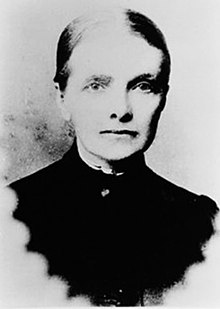Lucy Lloyd
| Lucy Lloyd | |
|---|---|
 |
|
| Born |
7 November 1834 Norbury, England |
| Died | 31 August 1914 (aged 79) Wynberg, Cape Town |
| Fields | linguist, folklore |
Lucy Catherine Lloyd (7 November 1834 – 31 August 1914) was the creator, along with Wilhelm Bleek, of the 19th-century archive of ǀXam and !Kung texts.
Lucy Catherine Lloyd was born in Norbury in England on 7 November 1834. Her father, William H.C. Lloyd, Archdeacon of Durban, was the rector of Norbury and vicar of Ranton, two villages in western England in Staffordshire. He was also chaplain to the Earl of Lichfield, to whom he was related through his mother. Lucy Lloyd's mother was Lucy Anne Jeffreys, also a minister's daughter, who died in 1842 when Lucy was eight. Lucy Lloyd was the second of four daughters. Her father remarried in 1844 and had 13 additional children with his new wife. After her mother's death, Lucy and her sisters lived with their maternal uncle and his wife, Sir John and Caroline Dundas, from whom they received a private and apparently liberal education.
In 1847 Robert Gray was consecrated Bishop of Cape Town and he established a diocese that included Natal, where it was felt that clergymen were needed. William Lloyd was sent to Durban along with his family in April 1849, when Lucy was 14, as Colonial and Military Chaplain to the colony's British forces. He later became Archdeacon of Durban. An independent Anglican diocese was established in 1853, with the consecration of John William Colenso as bishop. Colenso established a residence in Pietermaritzburg and a party of 45 accompanied him, including the young Wilhelm Bleek who was to assist Colenso as anthropologist and philologist.
The Lloyd family had limited financial means in Durban even though the four older girls had inherited some money from their mother. Lucy and her sisters are said to have had liberal and unorthodox views and Lucy had trained as a teacher. Lucy and Jemima (who was to marry Wilhelm Bleek) were very close, and both were repelled by their father whom they thought to be a hypocrite. After Lucy had refused to allow him to spend her inheritance he threw her out of their home and she went to stay on a farm owned by people called the Middletons. In 1858 Lucy became engaged to the sweet and widely travelled man George Woolley, the son of a minister. According to Lucy's sister Jemima the Middletons were wretched people who sowed distrust and pain between the couple. Lucy broke off the engagement, but she regretted this all her life, blaming herself for George's early miserable death. In a letter she wrote much later to her niece, Helma, on the occasion of the latter's engagement she said: 'May yours (with your dear Mother beside you), have a very different ending. I missed my dear Mother so sorely then, and the loving counsel and advice, which she could have given me. I had only my own theories and inexperience to go upon.'
...
Wikipedia
